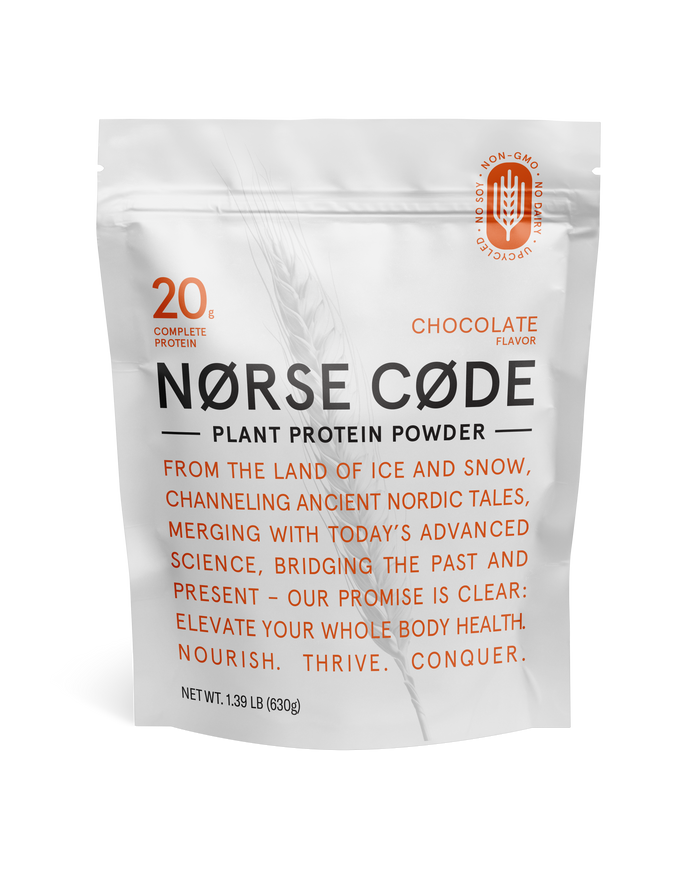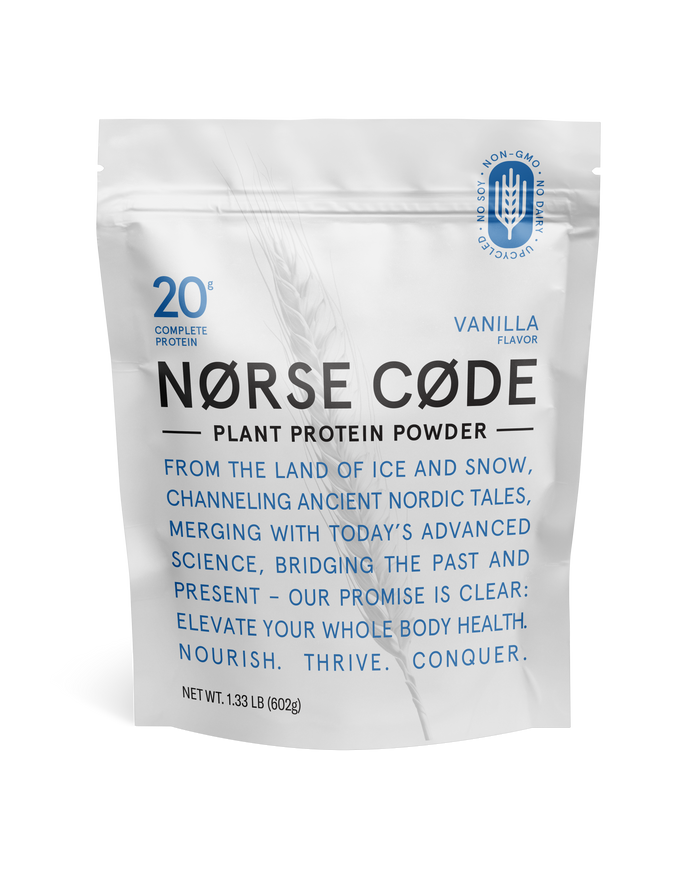
Sustainable Protein Powder: A Comprehensive Guide
Introduction to Sustainable Protein Powder
In a world seeking cleaner nutrition, sustainable protein powder stands out as a smart way to meet fitness goals while protecting the planet. By focusing on plant based options, eco-friendly sourcing, and minimal waste, brands like NØRSE CØDE prove you can fuel up with a protein supplement that’s both powerful and responsible.
This guide explores the key aspects of sustainability—from ingredient sourcing to plastic-free packaging—and answers pressing questions about how a protein powder can align with your environmental values. Whether you’re new to plant based nutrition or simply want to refine your routine, this article will help you make informed, Earth-friendly choices.
Related Reading: For a deeper dive into plant-based nutrition, read our Ultimate Guide to Plant-Based Protein.
Understanding the Concept of Sustainability in Protein Powders
“Sustainability” in protein powder production means lowering your carbon footprint, reducing food waste, and ensuring fair practices across the supply chain. Here’s how:
• Minimal Environmental Impact: Using upcycled or renewable ingredients cuts greenhouse gas emissions.
• Ethical Treatment: Fair wages and humane processes protect both people and animals.
• Long-Term Viability: By choosing a plant based approach, we help preserve water, land, and habitats for generations to come.
Sourcing of Ingredients
• Plant Based Focus
Relying on crops like peas, hemp, or barley drastically reduces water and land usage compared to animal proteins. NØRSE CØDE takes this a step further by upcycling leftover barley—a technique that mitigates food waste while delivering a potent amino acid profile in your protein supplement.
• Local & Organic Methods
Many sustainable brands source locally to shorten transport routes, and partner with organic farms to avoid harmful pesticides.
Production Processes
• Energy Efficiency
Adopting renewable energy like solar or wind slashes emissions during protein powder manufacturing.
• Waste Reduction
Recycling water, composting scraps, and refining upcycled grains keeps production lean and eco friendly.
Science Says: According to a study published in Global Environmental Change, shifting diets toward plant-based protein can significantly lower greenhouse gas emissions and reduce land use.
Packaging and Distribution
• Plastic-Free or Low-Waste Packaging
Recyclable or biodegradable materials curb pollution. NØRSE CØDE continuously explores innovative packaging to reduce plastic.
• Transportation Smarts
Efficient shipping routes help keep the carbon footprint of each protein supplement under control.
Importance of Sustainability in Promoting a Healthy Lifestyle
Sustainability enhances not only the planet’s well-being but your own, too. A high-quality, plant based protein supplement often uses fewer additives, giving you more nutrients minus the fillers.
1. Nutritional Benefits
• Cleaner Ingredients: Responsibly sourced produce offers more vitamins, minerals, and amino acid diversity.
• Fewer Additives: Natural, minimally processed formulas generally avoid artificial flavors or sweeteners, making your protein shake simpler and healthier.
2. Ethical Practices
• Fair Trade: Local farms, fair wages, and safe labor conditions foster stronger communities.
• Reduced Animal Impact: A plant based diet shrinks livestock-driven deforestation and lowers emissions.
3. Lower Carbon Footprint
• Land & Water Savings: Plant-based, upcycled, or lab-grown proteins need significantly less farmland and water than raising livestock.
• Sustaining Future Athletes: A healthier planet ensures tomorrow’s athletes can still enjoy its resources.
Reducing Environmental Impact
By choosing a sustainable protein powder, you actively protect ecosystems and future food sources.
Cutting Food Waste
• Upcycling
Using barley from brewing eliminates potential landfill waste. By harnessing these grains, we transform “trash” into “treasure,” strengthening your next protein shake with eco-friendly nourishment.
Greenhouse Gas Reduction
• Fewer Emissions
Replacing animal proteins with plant based ones drastically lowers methane and carbon dioxide output.
• Energy Use
Some brands adopt green power like wind or solar, offsetting the typical carbon demands of large-scale protein powder production.
Science Says: Research in the Journal of the International Society of Sports Nutrition found that plant-based protein blends can match whey for muscle gains when total protein intake is sufficient—further evidence that you can go green without sacrificing results.
Sustainable Protein Powder: What to Look For
Choosing the right protein supplement can be overwhelming. Here are critical factors:
1. Transparent Sourcing
• Look for upcycled or local ingredients, plus clear info on farming or production.
2. Eco Friendly Packaging
• Recyclable or biodegradable packaging drastically cuts plastic waste.
3. Third-Party Certifications
• Organic, Fair Trade, or Non-GMO labels confirm higher standards.
4. Taste & Texture
• Sustainability shouldn’t mean gritty shakes. Modern processes yield protein powder that can taste great with cocoa, vanilla, or fruit.
NØRSE CØDE Example: We emphasize upcycled barley + pea protein, test each batch for purity, and keep packaging minimal—so you can power your day while respecting the environment.
The Sustainability of Whey Protein
While whey protein remains popular, it presents sustainability challenges:
• High Resource Needs: Dairy farming consumes substantial water and land.
• Methane Emissions: Cows produce methane, a potent greenhouse gas, accelerating climate change.
• Byproduct Advantage: Whey is an upcycled byproduct of cheese-making, which does mitigate some waste—but the larger dairy operations still carry a hefty environmental load.
If you prefer whey, aim for sources that use renewable energy, local dairy, or regenerative farm practices—though a plant based alternative often has an even smaller footprint.
Battle of the Gains: Plant-Protein vs. Whey Protein
When comparing plant based protein to whey, consider:
1. Amino Acid Profile
• Well-crafted plant based blends (like pea + barley) offer a full spectrum of essential amino acids.
2. Digestibility
• Whey digests quickly but can trigger bloating in lactose-sensitive individuals. Plant based powders digest steadily, fueling consistent energy.
3. Resource Footprint
• Whey ties into larger-scale dairy farming, whereas plants typically require less land and water.
4. Added Health Perks
• Many plant based powders boast fiber, antioxidants, and beneficial phytochemicals, supporting overall wellness.
Dive Deeper (Internal Link): Want a closer comparison? Check out our post on The Difference Between Whey Protein and Plant-Based Protein.
Choosing Clean: Your Guide to Sustainable Protein
Now that you see how a plant based or eco-focused protein supplement can curb environmental harm and support your fitness, let’s outline your next steps:
1. Check Labels
• Seek out “upcycled,” “organic,” or “locally sourced.” A brand’s transparency indicates its commitment to genuine sustainability.
2. Sample the Taste
• Today’s plant based blends feature flavors that can enhance your protein shake—so you don’t compromise on taste.
3. Monitor Results
• If you’re switching from whey to a plant based formula, track changes in energy, recovery, and overall digestion.
4. Stay Open-Minded
• The market evolves quickly. Keep an eye on new protein powder innovations, like pea-lentil mixes or lab-grown varieties that push boundaries further.
More Insights: Curious about nutrition myths? Read Is Plant-Based Protein Healthy? Debunking Common Myths to see how we address typical misconceptions.
Conclusion
A sustainable protein powder respects your body and the planet—lowering greenhouse gas emissions, reducing food waste, and supporting ethical farming. By choosing plant based ingredients, minimal-waste packaging, and thoughtful distribution, you help protect resources for future generations.
At NØRSE CØDE, we blend Nordic wisdom with modern science—upcycling barley, minimizing plastic, and delivering bold, eco friendly results in every scoop. Ultimately, picking a protein supplement aligned with sustainability is more than a trend; it’s a proactive stance for better health and a greener tomorrow.
Ready to Fuel the Future? Swap out conventional shakes for an environmentally conscious protein powder—and join us in shaping a healthier, stronger world, one scoop at a time.
NØRSE CØDE Chocolate Plant Protein Powder
- Regular
- $44.50
- Sale
- $44.50
- Regular
-
- Unit Price
- per
NØRSE CØDE Vanilla Plant Protein Powder
- Regular
- $44.50
- Sale
- $44.50
- Regular
-
- Unit Price
- per
NØRSE CØDE Stainless Shaker
- Regular
- $35.00
- Sale
- $35.00
- Regular
-
- Unit Price
- per




